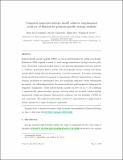| dc.contributor.author | Goldman, Mark Jacob | |
| dc.contributor.author | Vandewiele, Nick | |
| dc.contributor.author | Ono, Shuhei | |
| dc.contributor.author | Green Jr, William H | |
| dc.date.accessioned | 2019-12-18T21:21:33Z | |
| dc.date.available | 2019-12-18T21:21:33Z | |
| dc.date.issued | 2019-06 | |
| dc.date.submitted | 2019-02 | |
| dc.identifier.issn | 0009-2541 | |
| dc.identifier.uri | https://hdl.handle.net/1721.1/123303 | |
| dc.description.abstract | Position-specific isotope analysis (PSIA) can aid in understanding the origins of molecules. Destructive PSIA requires a model to track isotope substitution through reaction pathways. We present a general method based on the Reaction Mechanism Generator software to construct quantitative kinetic models with atom-specific isotope tracking and kinetic isotope effects during thermal decomposition of model compounds. A propane mechanism produced with this method is compared to experiments. Without tuning kinetic or thermodynamic parameters to experimental data, the mechanism replicated, within experimental uncertainty, the relationship between the parent molecule's position-specific values and the fragments' enrichments. These isotope-specific models can serve as an in silico platform to quantitatively assess secondary isotopic reactions which can scramble position-specific enrichments, design and optimize experimental conditions, and test feasibility of PSIA for new compounds. The proposed methodology creates new opportunities for applications in isotope analysis for a range of chemical compounds. Keywords: Kinetic isotope effect; Symmetry; Degeneracy; Isotopologue; Enrichment; Automated mechanism generation | en_US |
| dc.description.sponsorship | National Science Foundation (Grant 1122374) | en_US |
| dc.language.iso | en | |
| dc.publisher | Elsevier BV | en_US |
| dc.relation.isversionof | http://dx.doi.org/10.1016/j.chemgeo.2019.02.036 | en_US |
| dc.rights | Creative Commons Attribution-NonCommercial-NoDerivs License | en_US |
| dc.rights.uri | http://creativecommons.org/licenses/by-nc-nd/4.0/ | en_US |
| dc.source | Mark Goldman | en_US |
| dc.title | Computer-generated isotope model achieves experimental accuracy of filiation for position-specific isotope analysis | en_US |
| dc.type | Article | en_US |
| dc.identifier.citation | Goldman, Mark Jacob et al. "Computer-generated isotope model achieves experimental accuracy of filiation for position-specific isotope analysis." Chemical Geology 514 (June 2019): 1-9 © 2019 Elsevier B.V. | en_US |
| dc.contributor.department | Massachusetts Institute of Technology. Department of Chemical Engineering | en_US |
| dc.contributor.department | Massachusetts Institute of Technology. Department of Earth, Atmospheric, and Planetary Sciences | en_US |
| dc.relation.journal | Chemical Geology | en_US |
| dc.eprint.version | Author's final manuscript | en_US |
| dc.type.uri | http://purl.org/eprint/type/JournalArticle | en_US |
| eprint.status | http://purl.org/eprint/status/PeerReviewed | en_US |
| dc.date.updated | 2019-12-18T19:31:51Z | |
| dspace.date.submission | 2019-12-18T19:31:53Z | |
| mit.journal.volume | 514 | en_US |
